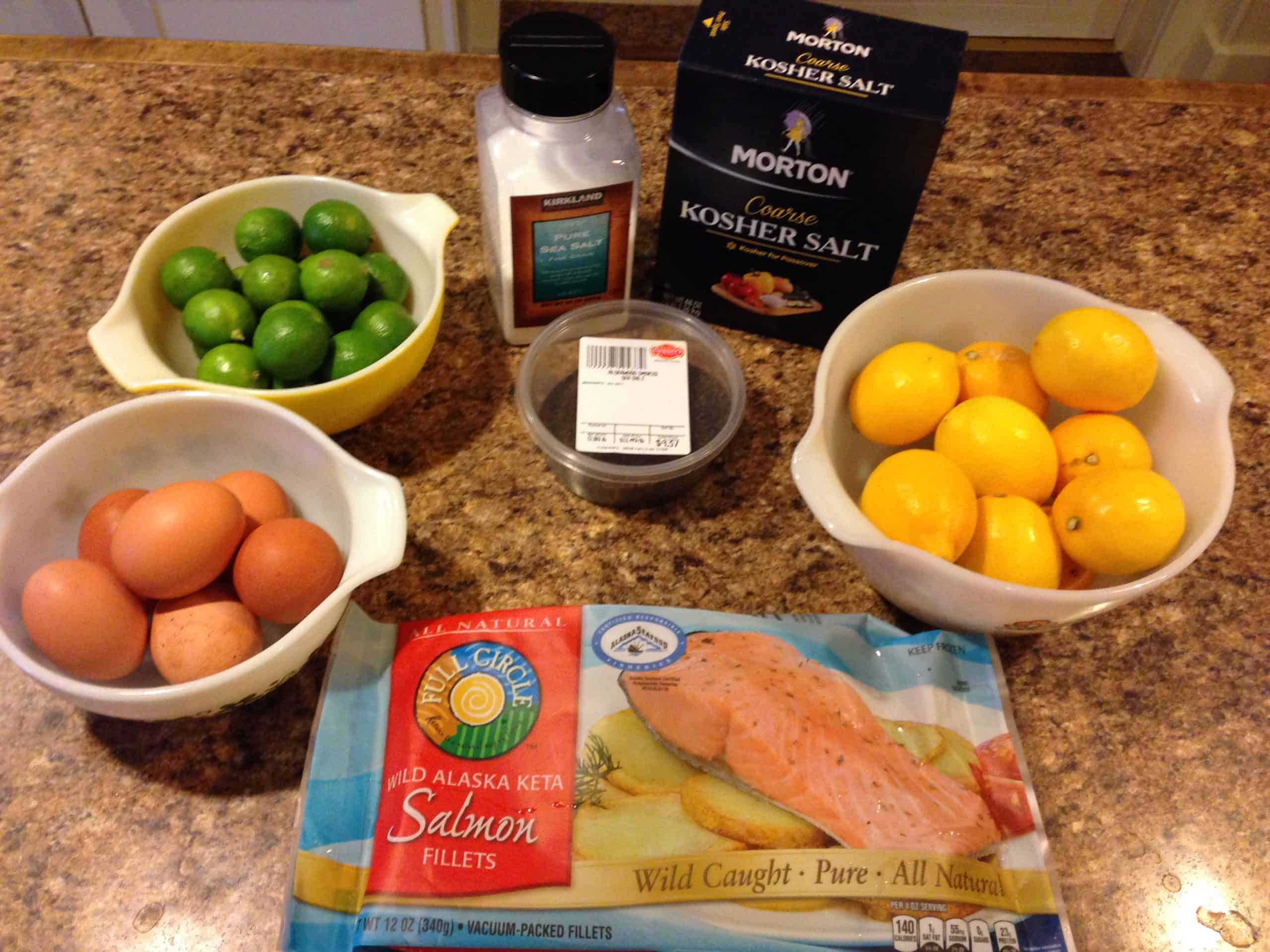For the February challenge in the “Food in Jars Mastery Challenge,” the category was salt preserving. While I am experienced in various methods of food preservation, salt preserving was kind of a new one for me. Smoked salmon is a favorite of mine. I was familiar with the concept of salt-preserving salmon (gravlax/lox), but I had never tried it.
As people started posting on the Facebook group for the challenge throughout February, I learned that you can salt-preserve lemons and limes to be used in sauces, marinades, etc. And margaritas!
I also learned that you can salt-preserve egg yolks and my first thought was, “Why the heck would you preserve egg yolks, you can buy eggs anytime and they aren’t expensive!” But, after some research, I learned that salt-preserved egg yolks, once salt-cured and dried, have the texture of aged cheese and can be grated on top of pasta and other dishes to add a rich and unique flavor.
My Month of Salt-Preserving
At the beginning of February when the challenge was brand new, I was honestly considering skipping this month. But, as the month went on and I learned more about these things, I ended up trying them all!
So, with this post, I bring you the results of my salt-preserved Alaskan Keta Salmon, salt-preserved Meyer lemons, salt-preserved key limes, and salt-preserved farm-raised brown egg yolks.
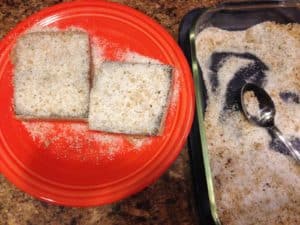 I started everything on Monday night and made myself notes of when each thing needed to be removed from salt, finished, etc. As I write this, it is the following Sunday night and everything is done except for my limes (which are doing well on the counter yet.)
I started everything on Monday night and made myself notes of when each thing needed to be removed from salt, finished, etc. As I write this, it is the following Sunday night and everything is done except for my limes (which are doing well on the counter yet.)
Gravlax / Lox
For this challenge, I researched several recipes and ended up doing kind of a combination of this recipe from SeriousEats.com and this one from TheKitchn.com.
I didn’t have any fresh dill and didn’t really want it to be that dill-y anyway. Instead, I used about a tablespoon of salmon seasoning, which is basically a mix of dill, pepper, lemon, and garlic.
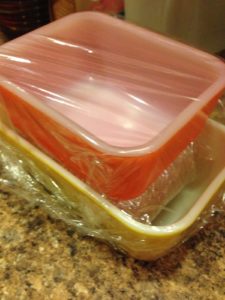 For the smoked salt portion of the mixture, I used smoked Alderwood salt. During the prepping process, I left the skin on both pieces of my salmon. Preferably, I would have taken it off, but had trouble so just left it on.
For the smoked salt portion of the mixture, I used smoked Alderwood salt. During the prepping process, I left the skin on both pieces of my salmon. Preferably, I would have taken it off, but had trouble so just left it on.
I coated both pieces of salmon top and bottom with the cure mixture. I folded the pieces together skin side out and wrapped in plastic wrap inside a glass bowl. Then, I put another glass bowl on top to weigh it down a bit.
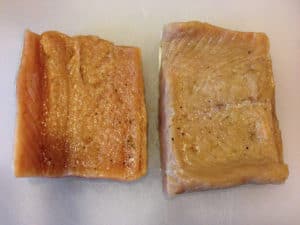 I left it in the fridge for 5 days, though the recipe said it could come out after 2-3 days. There was quite a bit of liquid in the bottom of the dish when I took it out after 5 days. I think next time I would check it more often and drain that off. But, it didn’t seem to hurt it the way it was.
I left it in the fridge for 5 days, though the recipe said it could come out after 2-3 days. There was quite a bit of liquid in the bottom of the dish when I took it out after 5 days. I think next time I would check it more often and drain that off. But, it didn’t seem to hurt it the way it was.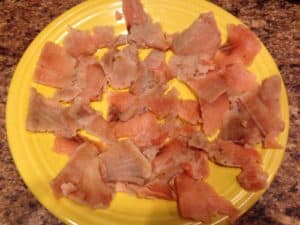 It was saltier than we wanted it, so after we sliced it all up, we soaked it in a bowl of water for 20 minutes and then drained it off and laid it out on paper towels to get rid of excess moisture.
It was saltier than we wanted it, so after we sliced it all up, we soaked it in a bowl of water for 20 minutes and then drained it off and laid it out on paper towels to get rid of excess moisture.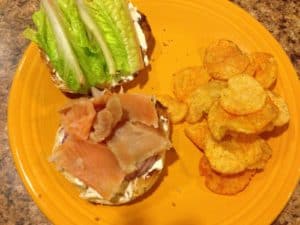 Then, we put some of it on a toasted everything bagel with cream cheese, sliced red onions, and lettuce and ate it. Yum!
Then, we put some of it on a toasted everything bagel with cream cheese, sliced red onions, and lettuce and ate it. Yum!Salt-Preserved Meyer Lemons
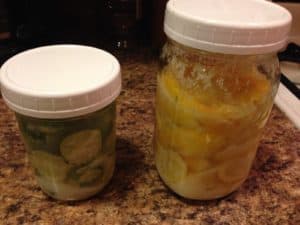
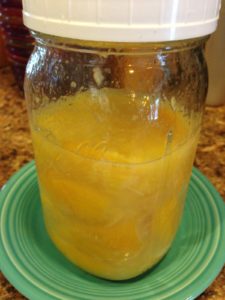 The photo on the left is what they looked like when I took them off the counter and put them in the refrigerator. I’ve been careful to keep the lemons down under the juice, I did have them weighted down with glass weights to keep the lemons under the juice until I put them in the refrigerator.
The photo on the left is what they looked like when I took them off the counter and put them in the refrigerator. I’ve been careful to keep the lemons down under the juice, I did have them weighted down with glass weights to keep the lemons under the juice until I put them in the refrigerator.Salt-Preserved Key Limes
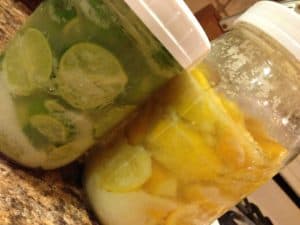 For the salt-preserved key limes, I used this recipe. These guys have been hanging out with the lemons on the counter until today, and I’ve also been shaking them each day to get the salt distributed.
For the salt-preserved key limes, I used this recipe. These guys have been hanging out with the lemons on the counter until today, and I’ve also been shaking them each day to get the salt distributed.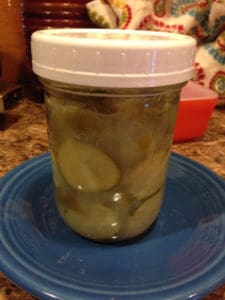 The photo on the left is what my limes looked like after being on the counter for 6 days. The recipe says they will sit on the counter for less than a month. For some reason, the limes take longer than the lemons that went into the refrigerator today. Perhaps it’s because their rind is thicker? I’m not sure.
The photo on the left is what my limes looked like after being on the counter for 6 days. The recipe says they will sit on the counter for less than a month. For some reason, the limes take longer than the lemons that went into the refrigerator today. Perhaps it’s because their rind is thicker? I’m not sure.Salt-Preserved Egg Yolks
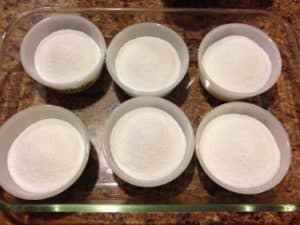 For the egg yolks, I used this recipe for duck eggs from the Food in Jars website, though I used farm-raised brown chicken eggs.
For the egg yolks, I used this recipe for duck eggs from the Food in Jars website, though I used farm-raised brown chicken eggs.
Instead of a muffin pan, I used these glass ramekins. I put some of the cures on the bottom of each. Then, one egg yolk was placed in each ramekin and covered with the cure mixture.
I then covered the whole thing with plastic wrap and the lid that goes on this pan.
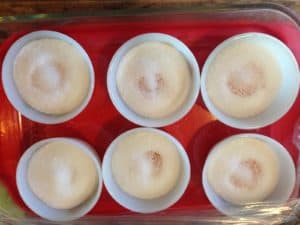
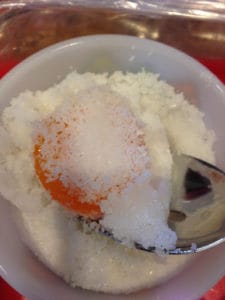
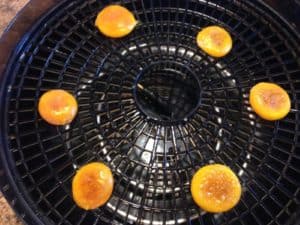 I rinsed them all off gently and put them in the dehydrator for 2-3 hours. From here, the recipe says they can be stored in the refrigerator for up to a month. We will be trying them soon grated over some pasta!
I rinsed them all off gently and put them in the dehydrator for 2-3 hours. From here, the recipe says they can be stored in the refrigerator for up to a month. We will be trying them soon grated over some pasta!Have you done any food preservation using the salt-preserving method? If so, what did you do and how did you like it? Tell us about it in the comments below!
For more blog posts like this one, click here.

